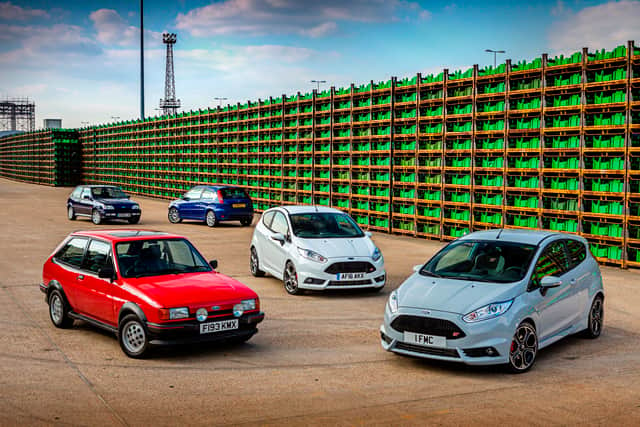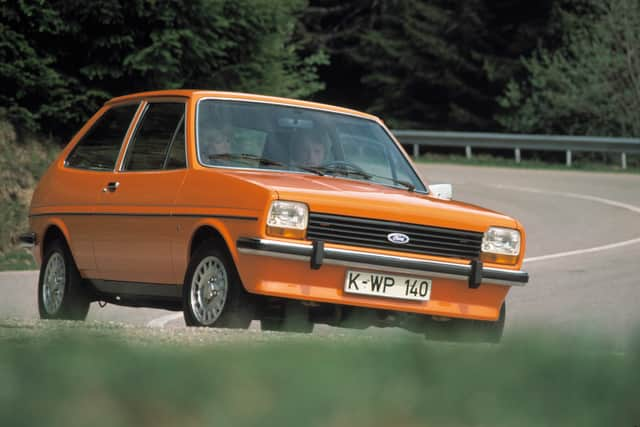Ford Fiesta discontinued: why is car being axed, when will production stop, is there an electric replacement?
The Blue Oval’s announcement comes after growing speculation that the supermini was under threat as the brand accelerates its shift towards an all-electric model range. The decision was announced on Wednesday by Ford of Europe’s general manager Martin Sanders, who tweeted: “As one era ends next summer, another is just starting. Farewell Fiesta, it’s time to say goodbye to the little car that has touched us all – thanks for all the memories.”
Advertisement
Hide AdAdvertisement
Hide AdProduction of the supermini will end at Ford’s Cologne plant by the end of June 2023 as the factory is refitted to become the centre of the marque’s electric vehicle production. Ford also confirmed that the S-Max and Galaxy people carriers will be discontinued from next year, with production at its Valencia factory ceasing in April 2023. It previously announced that the Focus and Mondeo are also due to be dropped from the range.
In a statement, Ford said: “At Ford in Europe, we are accelerating our efforts to go all-in on electrification with our passenger vehicles being fully electric by 2030 – and all vehicles across our Ford portfolio by 2035. As we get ready to transition to an electric future, we will discontinue production of S-Max and Galaxy in Valencia, Spain in April 2023 and discontinue Fiesta production in Cologne, Germany by end of June 2023.


“We will introduce three new exciting electric passenger vehicles and four new electric commercial vehicles in Europe by 2024. We plan to sell more than 600,000 electric vehicles in the region by 2026, and the electric passenger vehicle production at the Cologne Electrification Centre will reach 1.2 million vehicles over a six-year timeframe.”
Britain’s best-seller
Ford has built 22 million Fiestas since its launch in 1976 and the Fiesta is the brand’s best-selling car in Europe and Britain. In the 46 years since it went on sale, 4.8 million examples have been sold in Britain and for 12 consecutive years it was the country’s best selling car. Its demise comes as car brands increasingly focus on larger crossover and SUV models which are growing in popularity and provide better profits than compact models.
After topping the list of most registrations for more than a decade, sales of the Fiesta have been declining in recent years, a problem exacerbated by supply shortages that saw Ford temporarily pause orders on the car earlier this year. It failed to make the list of top 10 best sellers in 2021 and doesn’t feature in the year-to-date list for 2022, while the larger Puma crossover and Kuga SUV are in third and seventh position respectively. The situation is similar in Europe, with the Puma outperforming the Fiesta significantly over the last 18 months.
The Puma is set to be updated as an EV in 2024 and Ford has confirmed plans for two other electric passenger cars by 2024 along with five electric commercial vehicles. It already sells the Mustang Mach-e SUV and will launch a “medium-sized crossover” in 2023 followed by a “sport crossover” in 2024.
A video released to mark the announcement appears to dismiss any idea that the Fiesta could return as an EV and instead hints that Ford’s small car future lies with the electrified Puma.
Watershed moment
Erin Baker, editorial director at Auto Trader commented: “Although it’s sad to see such an icon disappear from the market, it should enable one of the biggest car brands to really knuckle down on EVs and make them more accessible to more car buyers, which is a very positive step in the right direction.”
Advertisement
Hide AdAdvertisement
Hide Ad

James Fairclough, CEO of AA Cars, added:“News that production will end for the enduringly-popular Ford Fiesta is a watershed moment in car manufacturing. The Fiesta has been one of the UK’s favourite vehicles since its introduction in 1977.
“The transition to electric vehicles, and changing consumer preferences, means that manufacturers are making tough decisions about the cars they produce. Many British drivers, however, will be disappointed to hear that Ford is calling time on this iconic model.
“Thankfully for Fiesta devotees, the car will have a strong presence on the secondhand market for many years to come. And when the very last Fiestas roll off the production line they are likely to be much sought-after.”
Comments
Want to join the conversation? Please or to comment on this article.
